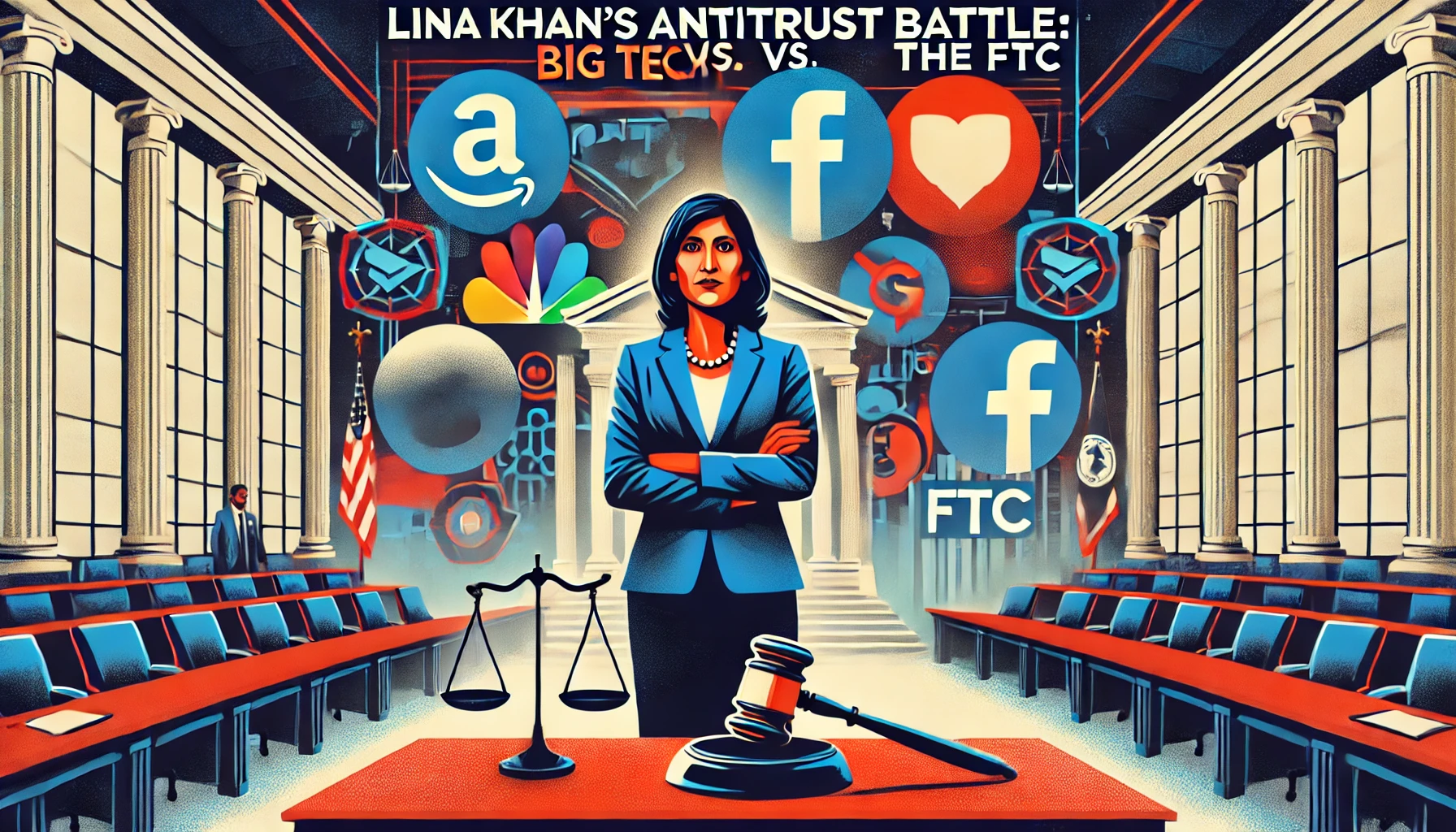FTC Trustbuster Lina Khan: Feared in Boardrooms, Cheered by Progressives — and Even Some MAGA Republicans
Since her appointment as Chair of the Federal Trade Commission (FTC) in 2021, Lina Khan has transformed the agency into a formidable force against monopolies and big tech dominance. Feared in corporate boardrooms, yet admired by progressives and even some MAGA Republicans, Khan has become one of the most talked-about figures in Washington’s regulatory landscape. Under her leadership, the FTC has pursued aggressive antitrust enforcement actions, particularly targeting tech giants that dominate the digital economy.
This blog explores Lina Khan’s antitrust strategy, her influence on FTC regulatory actions, and how her bold moves are reshaping corporate America and earning her bipartisan political support.
Lina Khan’s Rise to Power: A New Face of the FTC
Before becoming the Chair of the FTC, Lina Khan was already well known for her criticism of big tech companies, particularly through her groundbreaking paper, Amazon’s Antitrust Paradox. Her views caught the attention of many who believed that antitrust enforcement in the U.S. had become too weak, especially when dealing with the monopolistic behavior of major tech firms.
Once appointed, Lina Khan wasted no time in steering the FTC toward more aggressive regulation. Her approach represents a significant shift from the previous decades, where enforcement of FTC antitrust laws often took a backseat to the interests of large corporations.
Key Actions Under Lina Khan’s Leadership:
- Investigating Big Tech: Under Khan’s leadership, the FTC has opened investigations into big tech companies like Amazon, Google, and Facebook, aiming to curb their monopolistic practices(Benzinga).
- Challenging Mergers: The FTC has also scrutinized numerous mergers, blocking deals that would give corporations undue market power. This includes Khan’s move to halt Nvidia’s $40 billion acquisition of ARM, a semiconductor company.
- Expanding Antitrust Cases: Beyond tech, Khan’s FTC has expanded its focus to industries like pharmaceuticals and agriculture, ensuring competition across sectors(Supply Chain World magazine).
Her aggressive stance has sent ripples through corporate America, making Lina Khan a feared figure in many boardrooms.
FTC Antitrust Enforcement: A New Era of Regulatory Actions
Under Khan, the FTC is embracing a broader interpretation of antitrust enforcement, challenging business practices that stifle competition, even when traditional antitrust laws don’t easily apply. Her approach suggests a shift in how the agency views its role in safeguarding both consumer welfare and market competition.
FTC’s Big Tech Crackdown
One of the biggest targets of Khan’s tenure has been the FTC’s big tech crackdown. She has expressed concern over the monopolistic practices of companies like Facebook, Apple, Amazon, and Google, arguing that their control over key sectors of the digital economy creates an uneven playing field for smaller competitors.
FTC regulatory actions against these companies have included:
- Investigations into whether Amazon uses its platform to unfairly advantage its own products over third-party sellers.
- Lawsuits aimed at breaking up Facebook by forcing the company to sell off key acquisitions like Instagram and WhatsApp.
- New regulations for digital platforms that could limit the power of large tech firms to squash competition(AOL.com)(Global Training Center).
Monopoly Cases Beyond Tech
While big tech has been a focal point, the FTC’s monopoly cases under Khan extend to other sectors. The pharmaceutical industry, for instance, has been under scrutiny for mergers that could limit competition and inflate drug prices. Khan’s antitrust efforts are rooted in the idea that protecting competition benefits both consumers and small businesses.
By pursuing FTC antitrust enforcement across multiple industries, Khan’s regulatory efforts are reshaping the competitive landscape, ensuring that monopolies cannot thrive unchecked.
Bipartisan Support: Why Lina Khan Appeals to Both Progressives and Some MAGA Republicans
What makes Lina Khan a unique figure in Washington is her ability to garner support from across the political spectrum. While progressives have long cheered her aggressive stance against corporate monopolies, she has also earned some surprising endorsements from MAGA Republicans.
Why Progressives Support Lina Khan
Progressives have been some of Khan’s biggest champions, largely because her antitrust vision aligns with their calls for a fairer economy. Progressives argue that big tech companies, which now rival traditional monopolies in their market power, need to be held accountable for their practices. Lina Khan progressives see her leadership as essential to addressing income inequality, boosting small businesses, and ensuring consumer rights are protected(Global Training Center).
Khan’s ability to challenge big tech resonates deeply with progressives, who view these companies as symbols of corporate greed and unchecked power.
Why Some MAGA Republicans Support Her
Surprisingly, Lina Khan has also found support from some MAGA Republicans. While these Republicans traditionally favor deregulation, they share Khan’s concerns about the outsized influence of big tech on American politics and culture. Many MAGA Republicans believe that companies like Google and Facebook unfairly censor conservative voices on their platforms, giving them a vested interest in antitrust actions that would reduce the power of these tech giants(Supply Chain World magazine).
This unusual alliance between progressives and some MAGA Republicans demonstrates the broad political appeal of Khan’s approach to antitrust enforcement. While their motivations may differ, both sides see her work as a necessary step to restore balance to the economy and protect free speech.
The Future of Antitrust Under Lina Khan: What to Expect
As Lina Khan continues to push the FTC’s antitrust enforcement to new heights, the future of corporate regulation in America remains uncertain. However, a few trends are clear:
- Increased Scrutiny of Big Tech: The FTC big tech crackdown is expected to intensify, with further investigations into Amazon, Google, and Apple. New regulations aimed at curbing their market dominance are also on the horizon(Global Training Center).
- Challenging Future Mergers: Khan has signaled that the FTC will take a more proactive role in blocking mergers that concentrate market power, even in industries traditionally seen as outside of tech.
- Bipartisan Collaboration: While Khan’s policies are controversial, her ability to unite some MAGA Republicans and progressives suggests that FTC antitrust enforcement could continue to enjoy bipartisan support, at least when it comes to reining in big tech.
Key Challenges Ahead
Despite her bold agenda, Khan faces numerous challenges. Legal battles with tech giants are likely to drag on for years, and the courts have not always been sympathetic to the FTC’s monopoly cases. Additionally, corporate lobbying efforts may seek to curtail the FTC’s regulatory actions, making it harder for Khan to achieve her ambitious goals.
Lina Khan’s Bold Antitrust Agenda Appeals to Progressives, Conservatives, and Beyond
Lina Khan has redefined what it means to lead the FTC, bringing a new era of antitrust enforcement that targets big tech monopolies and seeks to level the playing field across industries. Feared by corporate boardrooms and cheered on by both progressives and some MAGA Republicans, Khan’s approach reflects a bipartisan desire to curtail the power of major corporations.
Under her leadership, the FTC is pushing back against unchecked market dominance, offering hope for a more competitive future. As the agency continues to pursue landmark monopoly cases and new regulatory actions, businesses across the U.S. are paying close attention.
To learn more about how antitrust law shapes the economy, visit Regent Studies for a deeper dive into regulatory policies and their impact on industries.
For ongoing updates on Lina Khan’s work at the FTC, check out this detailed analysis from Bloomberg.



